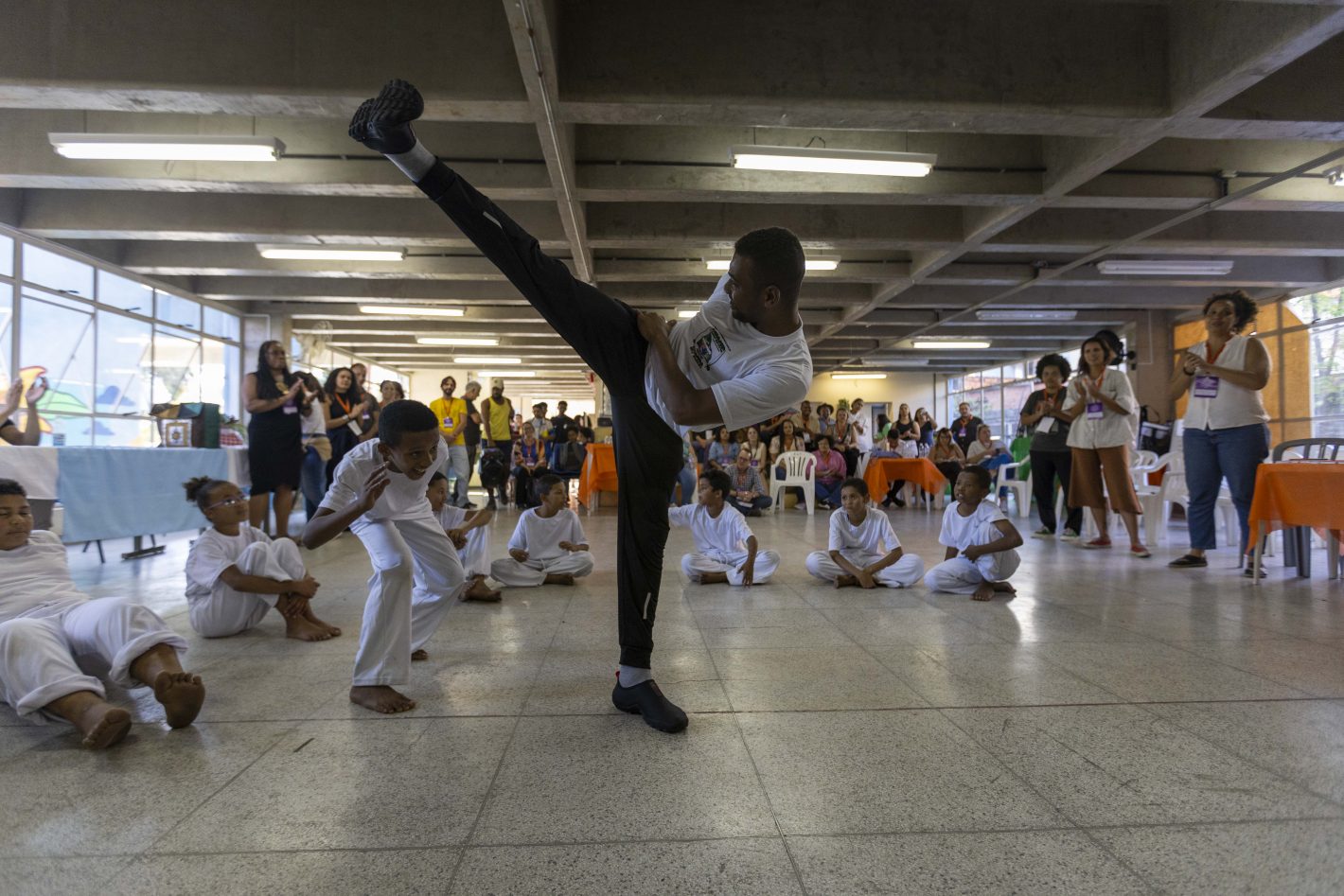By Aline Herrera, Letícia dos Santos, and Luiza Helena, members of the consultancy team at IDIS
Brazilian social investors who primarily focus on financing projects and initiatives of third parties represent less than 25% among institutes, foundations, and companies, according to the latest GIFE Census. Among social investors considered as hybrids – that is, those who both execute and finance projects (41% of the survey sample), the majority – about 55% – have a profile more oriented towards project execution than financing.
The volume of resources transferred to third parties in 2022 accounted for 37% of the total private social investment volume, equivalent to R$1.8 billion. More than half of these resources were received by civil society organizations (CSOs), chosen mainly for their reliability, transparency, and expertise in their areas of operation. When reporting the difficulties in investing in CSOs, social investors point to challenges in monitoring and evaluating initiatives, as well as the fragility in management or low capacity of CSOs seeking support.
On the other hand, the Peripheries and Philanthropy research: The barriers to accessing resources in Brazil, available in portuguese, conducted by the PIPA Institute in partnership with the Nu Institute, shows that 95% of respondents, responsible for implementing socio-environmental initiatives in the periphery, reported difficulties in accessing financing. These obstacles imposed on civil society organizations lead us to the following question: how can private social investment go further in addressing social inequalities?
One of the answers already on the radar of those considering the limits and advancements in the philanthropy field is simple: trust. In the text ‘Deepening the conversation about the importance of trust’, activist Joana Mortari indicates that there is recognition within the sector of the need to develop trust; however, it is necessary to move on to the next step, to develop the exercise of trust.
Thus, this text brings reflections on the role of private social investors, especially as grantmakers – that is, those who provide resources to third parties – in this path of more innovative and horizontal relationships, based on the principles of Trust-Based Philanthropy.
The Context of Trust-Based Philanthropy
“We believe that teams with frontline experience of challenges will know best how to put the money to good use”.
Mackenzie Scott
The highlighted excerpt is taken from a reflection by philanthropist Mackenzie Scott, following yet another of her billion-dollar donations. The American, who owns 4% of Amazon’s shares, is known for making substantial and unrestricted donations to nonprofit organizations around the world, totaling over $16.5 billion.
This model of donation began to strengthen in 2020, during the pandemic, for emergency relief funds aimed at supporting victims and extended to civil society organizations that work for communities, which historically face more difficulties in accessing financial resources.
The pandemic laid bare (not only for Mackenzie Scott) the need for philanthropic action worldwide, especially in the face of the numerous scenarios of calamity and social urgencies triggered by the spread of Covid-19. The scenario catalyzed the discussion of the need for simplified donation to gain even more strength, seeking to redesign the relationships and bonds between organizations and investors.
According to the Trust-Based Philanthropy: Self-Reflection Tool proposed by GIFE, the adoption of Trust-Based Philanthropy values starts with an internal analysis around four central points: the investor’s organizational culture, their decision-making processes, the structures through which they operate, and, finally, their practices. Therefore, we will discuss paths to begin this journey towards trust.
How Trust-Based Philanthropy Can Change the Game
To change the rules of the game and make philanthropy a more democratic and inviting action, Trust-Based Philanthropy redefines positions, bringing greater parity between the roles of the actors involved in the fight for social equity.
The most widespread practices of this grantmaking modality consist of promoting a ‘trust-based donation’ (not tied to specific projects), unrestricted (without budget allocation restrictions), and multi-year. At the grassroots level, practicing philanthropy based on trust requires an exercise of active listening to the needs of the beneficiaries. Values such as flexibility and transparency are essential to ensure that demands and limitations are understood from both sides of the relationship. Here, it also involves building closer and more humanized relationships between donor and beneficiary, simplifying workflows and starting from the premise of Trust-Based Philanthropy that there should be a shift in the relationship with the funder, moving from a position of ‘boss’ to being a partner. Thus, a good alternative involves creating feedback mechanisms, as 67% of donation-receiving organizations report that even if this practice occurs, it is not institutionalized.
Another possible action is not restricting the donated resource. It is common for the transfer of resources to be strictly directed towards costs directly related to the project, without considering the sustainability and structuring of the organization that executes it. In this sense, thinking about a free and unrestricted donation ensures autonomy for organizations to manage their resources based on what they identify as most critical, taking into account their survival, project expansion, and scalability. Here, it is also the responsibility of donors to proactively understand the organization’s priorities and possible additional support opportunities.
Also for this purpose, a good practice is the promotion of technical training, provided voluntarily and free of charge, for supported organizations, guiding them on tools that can assist in project management and continuity, such as Theory of Change and indicators. Also, according to the Peripheries and Philanthropy research by the PIPA Initiative, 95% of social organizations in peripheral territories indicated that they would like to receive training on financial and project management and believe that training impacts their ability to raise financial resources.
What are the challenges for this practice?
As pointed out by the Charities Aid Foundation in the World Giving Index 2023, strengthening a robust philanthropic ecosystem requires not only the adoption of good practices by governments and international funders but also ongoing work by civil society organizations regarding their governance and transparency to gain full public trust.
At this point, it is evident how the practice of trust-based philanthropy works in a two-way street, where both funders and organizations need to trust each other, as well as listen to the people and communities impacted. It is also essential for this practice that the donation-receiving organization is willing to share key information about its strategy and actions, thus ensuring horizontal and co-construction between the involved parties, both in receiving and transferring resources.
For many social investors, investing in organizations with their projects is still seen as a risk, whether due to lack of transparency or unfamiliarity with the trust-based methodology. In this sense, the growth of the practice is exponential: the more it is executed and publicized, the more widely diffused the methodology becomes, and the greater the tendency for adoption. Causes originating from social movements that already advocate for representation and equity are opening up frontiers in this modality, giving voice to marginalized groups and investing in funds with co-creation-based practices and trust-based practices, such as the Feminist Fos Fund (dedicated to gender issues) and The Black Fund (focused on racial issues).
Case Study: Chamex Institute and Transforming Territories
Although the grant call modality might not be the most suitable for these principles, organizations that want to start in this area, or those with lower institutional capacity to promote these systemic changes, can also join this movement through simpler actions in their existing resource allocation processes.
IDIS encourages its partners and clients to practice principles of trust-based philanthropy within their grantmaking practices. One of the funders that works with our consultancy team, the Chamex Institute, has been evolving each year in its approach to funded organizations. Since the first edition of the Citizenship Education Grant Call, the Institute values an open and direct relationship with its beneficiaries.
In addition to financial support, the five organizations awarded the grant call also undergo a Theory of Change workshop and indicator construction with IDIS’s expert team, ensuring that project monitoring is of quality, as well as strengthening its permanence and replicability. Last year, the 3rd Edition of the Citizenship Education Grant Call opened up space for up to 50% of the allocated resource to be used for personnel expenses (internal or outsourced) and up to 10% for administrative expenses (such as water, electricity, rent, and others), maintaining the guideline for this year’s edition.
As an additional action, finalist and awarded organizations are invited to join the Projects Portal, a showcase-style initiative designed to attract partners and publicize the social work developed.
Taking a step further, the Transforming Territories (TT) program, by IDIS in partnership with the Charles Stewart Mott Foundation, aims to support Community Foundations and Institutes (CFIs). These organizations work on strengthening a specific territory as bridges between local social organizations and initiatives, donors, civil society, and the government. In the Community Philanthropy modality, CFIs analyze the territory in which they are inserted comprehensively, having complete autonomy to allocate resources according to the needs and priorities of the region. Thus, financial transfers and technical support are directed more effectively towards local strengthening.
The great strength of the TT lies in its foundational values, which serve as pillars for trust-based philanthropy. Advocating for community protagonism, democratic values, transparency, sustainable practices, and networked actions promotes active engagement of local communities as drivers of regional development. This stimulates participatory processes, freedom of expression, and respect for diversity through collaborative initiatives aimed at raising awareness and caring for natural resources. All of this is complemented by an emphasis on transparent communication, encouraging the sharing of information and data dissemination.
This management model, combined with unrestricted and multi-year donations, establishes a relationship of trust between the donor (companies and partners supporting the TT) and the directly impacted organizations (CFIs). It is based on the principle that the action of CFIs can have a greater impact on the territory than verticalized direct donations. Additionally, the funding plays a role in strengthening the institutional development of CFIs, promoting these organizations in the Brazilian territory not only through financial resources but also through training and technical assistance.
Donations can be made by companies and philanthropists, adopting organizations or territories within the program. If you are interested, visit the website or contact IDIS.
The Change We Hope For
IDIS has been delving into these new philanthropy trends. The latest edition of Perspectives for Philanthropy in Brazil highlighted that support for the institutional strengthening of civil society organizations, from the standpoint of governance and transparency, can generate catalyzing changes towards higher levels of trust, in a virtuous circle.
Explore more case studies and get in touch to build these paths together.




